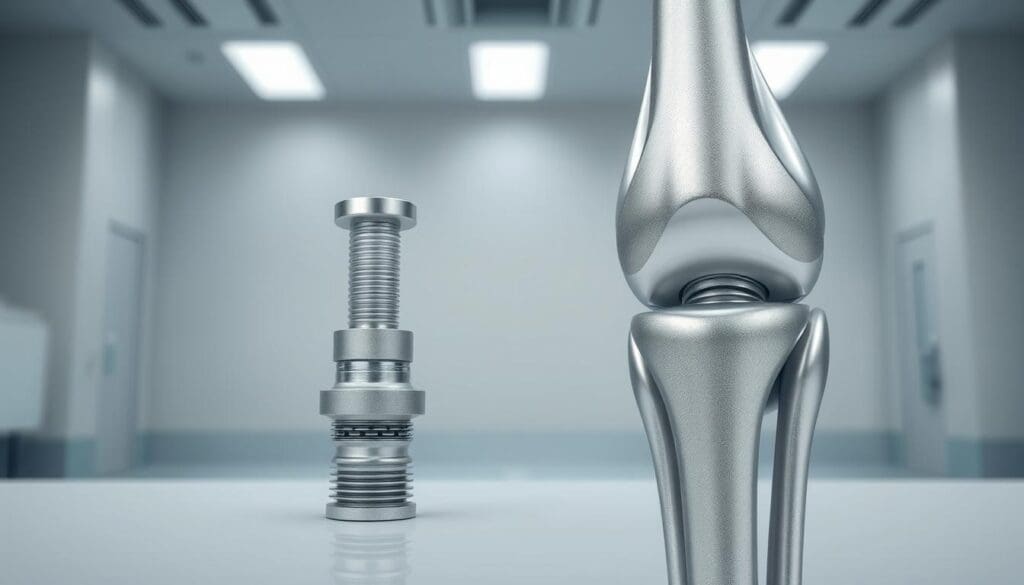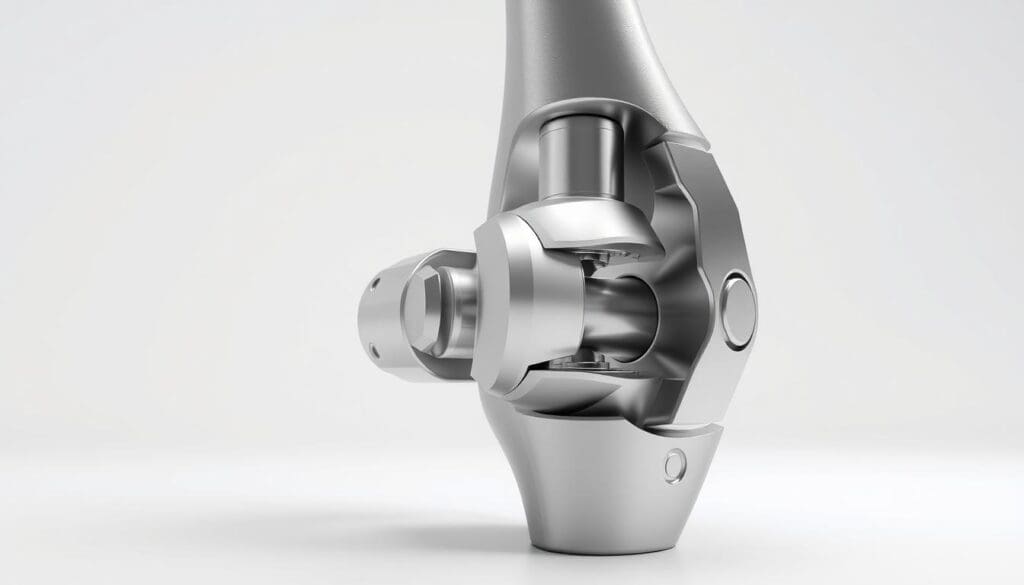
Choosing the right knee replacement is a big decision. Titanium knee solutions are durable and perform well. At Liv Hospital, we offer top-notch healthcare for international patients.
We know patients want the best when it comes to total knee replacement implants. That’s why we focus on excellence and care for you. We’ll help you understand lifespan, implant choices, and important materials.
Our team is dedicated to giving you the best care. We make sure you get the latest and most effective treatments.
Key Takeaways
- Durability and performance of titanium knee solutions
- Importance of understanding lifespan and materials
- Commitment to patient-centered care at Liv Hospital
- Guidance on choosing the right knee replacement
- Advanced total knee replacement implants available
The Science Behind Titanium Knee Replacements

Modern knee replacement surgery often uses titanium because of its strength, how well it works with the body, and how long it lasts. The knee is complex, bending, rolling, and gliding. Titanium knee replacements are made to move like the natural knee, giving patients a better feel and function.
What Defines a Modern Knee Replacement
A modern knee replacement closely mimics the natural knee’s movement. This is thanks to advanced design and materials like titanium alloys. These materials are strong and last long. Titanium also helps fit the knee replacement better, lowering the chance of problems and improving results for patients.
| Material | Strength | Biocompatibility | Durability |
|---|---|---|---|
| Titanium Alloy | High | Excellent | High |
| Cobalt Chrome | High | Good | High |
| Ceramic | Moderate | Excellent | Moderate |
The Evolution of Knee Replacement Materials
The search for better materials for knee replacements has led to big improvements. Early materials wore out and corroded, shortening the implant’s life. Titanium and other advanced alloys have greatly improved knee replacement performance.
Titanium alloys are a top choice because of their superior strength-to-weight ratio and how well they bond with bone. As research keeps going, we’ll see even more advancements in knee replacement materials, leading to better results for patients.
The Anatomy of Titanium Knee Implants

Titanium knee implants have changed orthopedic surgery a lot. They give patients a strong and reliable way to replace their knees. We’ll look at what makes up these implants and why they’re so good.
Titanium Alloys in Medical Applications
Titanium alloys are great for medical use because they’re strong, don’t rust easily, and are safe for the body. The most used alloy in knee replacements is Ti-6Al-4V. It’s strong and doesn’t rust. Titanium also sticks to bone well, which is perfect for implants.
Components of a Complete Knee Replacement System
A knee replacement system has many parts that work together. These parts include the femoral and tibial components, and polyethylene inserts.
Femoral Components
The femoral part replaces the damaged parts of the thigh bone. It’s made of titanium alloy. This part is built to handle daily activities.
Tibial Components and Polyethylene Inserts
The tibial part has a titanium alloy base and a polyethylene insert. The base goes on the shin bone, and the insert helps the knee move smoothly. This setup reduces wear and tear, making the implant last longer.
| Component | Material | Function |
|---|---|---|
| Femoral Component | Titanium Alloy | Replaces damaged femoral condyles |
| Tibial Baseplate | Titanium Alloy | Fixed to the tibia |
| Polyethylene Insert | Polyethylene | Provides smooth articulation surface |
So, titanium knee implants are made of many parts and materials. Knowing about these helps us see why they’re good and what might not be so great.
Key Fact 1: Lifespan of Titanium Knee Replacements
Knowing how long titanium knee replacements last is key for both patients and doctors. These implants are a big deal in orthopedic surgery. They last a long time and work well with the body.
How Long Does a Titanium Knee Replacement Last?
Research says titanium knee replacements last about 15 to 20 years. This is because titanium is very strong and doesn’t corrode easily. It can handle daily activities for a long time.
Factors That Extend or Reduce Implant Longevity
Many things can change how long a titanium knee replacement lasts. Knowing these can help make the implant last longer.
Weight and Activity Level Impact
Being overweight or very active can affect the implant. Being too heavy can stress the implant more, causing it to wear out faster. Also, doing lots of high-impact activities can make the implant not last as long. People who are more active might need to see their doctor more often.
Surgical Technique and Alignment
The way the implant is put in during surgery matters a lot. Getting it aligned right helps spread out stress evenly, which is good. Using new surgical methods can make the implant last longer.
To make your titanium knee replacement last, understand these factors. Going to regular check-ups and staying healthy are important. This helps the implant work well for a long time.
Key Fact 2: Biocompatibility of Titanium Knees
Titanium knee replacements are known for their high biocompatibility. This means the body tolerates titanium well, lowering the chance of bad reactions. We choose titanium alloys for our knee systems because they’re safe for human tissues.
Reduced Allergic Reaction Risk Compared to Other Materials
Titanium alloys have a low risk of causing allergies. Unlike some metals, like nickel alloys, titanium is safe for most people. This makes titanium knees a good choice for those with allergies or sensitive immune systems.
The biocompatibility of titanium is key to successful knee surgeries. It helps avoid allergic reactions, leading to a smoother recovery and better results for patients.
Osseointegration: How Titanium Bonds with Bone
Titanium’s ability to bond with bone is another big plus. This process, called osseointegration, creates a strong base for the artificial knee. It makes the joint more durable and functional.
Through osseointegration, titanium implants become very stable. This stability is vital for the success of the knee replacement. It helps spread the load naturally, reducing the chance of the implant coming loose.
The mix of low allergy risk and strong bone bonding makes titanium perfect for knee implants. As we keep improving in orthopedic tech, titanium alloys will stay a key part of reliable knee systems.
The Titanium Knee Advantage: Strength and Weight
Titanium knee replacements have changed orthopedic surgery. They offer strength and lightness. Let’s see how these benefits help patients.
Superior Strength-to-Weight Ratio
Titanium alloys have a great strength-to-weight ratio. Titanium knee implants are strong but light. This helps the bone and tissue around the knee.
This is key for quick recovery and lasting results.
| Material | Strength-to-Weight Ratio | Corrosion Resistance |
|---|---|---|
| Titanium Alloy | High | Excellent |
| Cobalt Chrome | Medium | Good |
| Stainless Steel | Low | Fair |
Impact on Patient Mobility and Comfort
Titanium knee replacements make patients move better and feel more comfortable. They are light, so patients can move naturally. This is important for patient happiness after surgery.
The benefits of titanium knee replacements are clear. They help patients recover faster and feel better. Titanium is a big step forward in knee surgery.
Key Fact 4: Material Comparisons for Knee Replacements
Choosing the right material for knee replacement surgery is key. Different materials have their own benefits and drawbacks. We’ll look at how cobalt chrome and titanium compare.
Cobalt Chrome vs Titanium Knee Replacement
Cobalt chrome and titanium are top picks for knee implants. Each has its own strengths and weaknesses.
Wear Resistance Properties
Cobalt chrome stands out for its durability. Titanium, on the other hand, is strong and resistant to corrosion but not as durable as cobalt chrome.
Weight and Feel Differences
Titanium is lighter, making the knee feel more natural. But cobalt chrome’s density offers stability.
| Material | Wear Resistance | Weight | Corrosion Resistance |
|---|---|---|---|
| Cobalt Chrome | High | Heavier | High |
| Titanium | Moderate | Lighter | High |
Ceramic and Polymer Alternatives
Ceramics and polymers are also used in knee replacements. Ceramics are known for their low wear and biocompatibility. Polymers, like UHMWPE, are used for their low friction and high wear resistance.
Each material has its own benefits. The choice depends on the patient’s needs and the surgeon’s advice. Knowing about different materials helps patients make better decisions for their surgery.
Key Fact 5: Best Total Knee Replacement Implants Today
Orthopedic surgery has seen big changes with new total knee replacement implants. Advances in technology and materials have led to better designs and functions.
Leading Titanium-Based Knee Systems
Titanium-based knee systems have changed total knee replacement surgery. They are strong, last long, and are safe for the body. Some top systems include:
- NexGen Legacy Knee System
- Persona Knee System
- Triathlon Knee System
Recent Innovations in Titanium Knee Design
New designs in titanium knees have focused on making them last longer and work better. Two big areas of improvement are:
3D-Printed Custom Components
3D printing has made it possible to create custom knee parts for each patient. This makes the implants fit better and helps patients recover faster.
Surface Treatments for Enhanced Performance
New surface treatments have been made to make titanium knee implants work better. These treatments help the implant bond with the bone and reduce wear.
These advancements have helped create best total knee replacement implants today. They offer patients better results and a better life.
Key Fact 6: Patient-Specific Factors in Material Selection
Choosing the right material for knee replacement is a detailed process. It’s all about what each patient needs. This makes the decision complex and personal.
What Is the Best Material for Knee Replacement?
The best material for knee replacement depends on several things. These include the patient’s age, how active they are, and their medical history. We look at these factors to find the best material for each patient.
When Titanium Is the Optimal Choice
Titanium is often the top choice for knee replacements. It has a superior strength-to-weight ratio and is biocompatible. Its benefits are clear for certain patients, based on their age, activity level, medical history, and allergies.
Age and Activity Considerations
Younger, more active patients often get titanium knee replacements. This is because titanium is strong and can handle a lot of activity. A study in Exploration Medicine shows titanium is great for those who stay active.
Medical History and Allergies
Patients with certain health issues or allergies might prefer titanium knee replacements. It’s hypoallergenic, which is a big plus. We check each patient’s medical history to see if titanium is right for them.
By looking at these factors, we can choose the best material for knee replacement. This ensures the best results for each patient.
Key Fact 7: Recovery and Long-Term Outlook with Titanium Implants
Knowing how to recover after titanium knee replacement surgery is key. We’ll walk you through the usual recovery time. We’ll also share tips on keeping your titanium knee replacement in top shape for years to come.
Post-Surgery Timeline and Milestones
The journey to recovery after knee surgery has key moments. Right after surgery, you’ll likely stay in the hospital for a few days. This time is for managing pain and starting to move around.
Physical therapy starts soon, helping you move your knee better and build muscle. You’ll start to feel better in 6 to 12 weeks. And you’ll keep getting better over the next few months.
Maintaining Your Titanium Knee Replacement
To keep your titanium knee replacement working well for a long time, regular check-ups are a must. These visits with your orthopedic surgeon help keep an eye on the implant. They also address any issues that might come up.
Staying at a healthy weight and doing low-impact activities also help. By following these steps, you can live an active life with your titanium knee replacement.
Conclusion: The Future of Titanium in Orthopedic Surgery
Titanium is key in modern orthopedic surgery, thanks to its role in knee replacements. The tech behind titanium knees has made them last longer and work better with the body.
More research and new tech in titanium knees will keep improving results. New materials and designs could lead to even better treatments for patients. This means more effective and tailored options for everyone.
The outlook for titanium in orthopedic surgery is bright. With new tech coming, titanium implants will likely get even better. This will help patients all over the world.
What are the benefits of titanium knee replacements?
Titanium knee replacements are strong, biocompatible, and durable. They are less likely to cause allergic reactions than other materials. This can lead to better mobility and comfort for patients.
How long does a titanium knee replacement last?
The life of a titanium knee replacement varies. It depends on the patient’s weight, activity level, and the surgery’s quality. Generally, a well-cared-for titanium knee can last 15 to 20 years or more.
What is the difference between cobalt chrome and titanium knee replacements?
Both cobalt chrome and titanium are used in knee replacements. Cobalt chrome is more resistant to wear. Titanium is stronger, lighter, and more compatible with the body. The choice depends on the patient’s needs and preferences.
What is osseointegration, and how does it relate to titanium knee replacements?
Osseointegration is when titanium bonds with bone tissue. This creates a strong, stable implant. It’s key to the success of titanium knee replacements, ensuring a long-lasting fit.
What are the advantages of 3D-printed custom components in knee replacement?
3D-printed custom components offer a precise fit and better performance. They are designed to match the patient’s anatomy. This reduces complications and improves outcomes.
How do I maintain my titanium knee replacement?
To keep your titanium knee replacement in good shape, live a healthy lifestyle. This includes regular exercise and a balanced diet. Also, don’t miss follow-up appointments with your healthcare provider.
What factors influence the selection of materials for knee replacement?
Many factors influence material selection for knee replacements. These include age, activity level, medical history, and allergies. Titanium is often the best choice for a strong, lightweight, and biocompatible implant.
Are there any alternative materials to titanium for knee replacement?
Yes, alternatives to titanium include ceramics and polymers. These materials have different properties and may suit specific patient needs and preferences.
How does the strength-to-weight ratio of titanium knee replacements impact patient outcomes?
Titanium’s high strength-to-weight ratio improves patient outcomes. It allows for a natural range of motion and reduces complications. This leads to better mobility and comfort for patients
References
- Chris Bailey Orthopaedics : https://www.chrisbaileyorthopaedics.com/blog/how-long-does-a-knee-replacement-last
- Surgical Solutions Network : https://surgicalsolutionsnetwork.ca/blog/how-long-does-a-knee-replacement-last
- News-Medical.Net : https://www.news-medical.net/news/20250314/Long-term-study-shows-knee-replacements-last-lifetime-for-active-young-adults.aspx




































